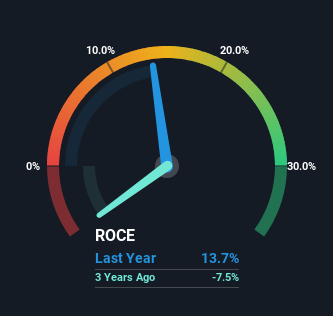IZOBLOK (WSE:IZB) Is Doing The Right Things To Multiply Its Share Price
There are a few key trends to look for if we want to identify the next multi-bagger. Firstly, we'd want to identify a growing return on capital employed (ROCE) and then alongside that, an ever-increasing base of capital employed. Basically this means that a company has profitable initiatives that it can continue to reinvest in, which is a trait of a compounding machine. So on that note, IZOBLOK (WSE:IZB) looks quite promising in regards to its trends of return on capital.
Understanding Return On Capital Employed (ROCE)
For those that aren't sure what ROCE is, it measures the amount of pre-tax profits a company can generate from the capital employed in its business. To calculate this metric for IZOBLOK, this is the formula:
Return on Capital Employed = Earnings Before Interest and Tax (EBIT) ÷ (Total Assets - Current Liabilities)
0.14 = zł17m ÷ (zł209m - zł84m) (Based on the trailing twelve months to October 2023).
Thus, IZOBLOK has an ROCE of 14%. In absolute terms, that's a satisfactory return, but compared to the Chemicals industry average of 9.8% it's much better.
View our latest analysis for IZOBLOK

While the past is not representative of the future, it can be helpful to know how a company has performed historically, which is why we have this chart above. If you'd like to look at how IZOBLOK has performed in the past in other metrics, you can view this free graph of IZOBLOK's past earnings, revenue and cash flow.
What Can We Tell From IZOBLOK's ROCE Trend?
We're pretty happy with how the ROCE has been trending at IZOBLOK. We found that the returns on capital employed over the last five years have risen by 168%. That's a very favorable trend because this means that the company is earning more per dollar of capital that's being employed. Interestingly, the business may be becoming more efficient because it's applying 25% less capital than it was five years ago. A business that's shrinking its asset base like this isn't usually typical of a soon to be multi-bagger company.
For the record though, there was a noticeable increase in the company's current liabilities over the period, so we would attribute some of the ROCE growth to that. Effectively this means that suppliers or short-term creditors are now funding 40% of the business, which is more than it was five years ago. And with current liabilities at those levels, that's pretty high.
The Bottom Line
From what we've seen above, IZOBLOK has managed to increase it's returns on capital all the while reducing it's capital base. Since the stock has only returned 20% to shareholders over the last five years, the promising fundamentals may not be recognized yet by investors. So exploring more about this stock could uncover a good opportunity, if the valuation and other metrics stack up.
On a final note, we found 4 warning signs for IZOBLOK (1 makes us a bit uncomfortable) you should be aware of.
While IZOBLOK isn't earning the highest return, check out this free list of companies that are earning high returns on equity with solid balance sheets.
New: AI Stock Screener & Alerts
Our new AI Stock Screener scans the market every day to uncover opportunities.
• Dividend Powerhouses (3%+ Yield)
• Undervalued Small Caps with Insider Buying
• High growth Tech and AI Companies
Or build your own from over 50 metrics.
Have feedback on this article? Concerned about the content? Get in touch with us directly. Alternatively, email editorial-team (at) simplywallst.com.
This article by Simply Wall St is general in nature. We provide commentary based on historical data and analyst forecasts only using an unbiased methodology and our articles are not intended to be financial advice. It does not constitute a recommendation to buy or sell any stock, and does not take account of your objectives, or your financial situation. We aim to bring you long-term focused analysis driven by fundamental data. Note that our analysis may not factor in the latest price-sensitive company announcements or qualitative material. Simply Wall St has no position in any stocks mentioned.
About WSE:IZB
IZOBLOK
Provides expanded polypropylene (EPP) components to the automotive industry worldwide.
Slightly overvalued with imperfect balance sheet.
Market Insights
Community Narratives



